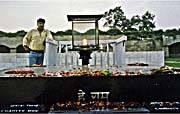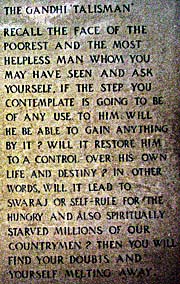Richard Attenborough's Film Gandhi
"Generations to come will scarce believe that such a one as this ever in flesh and blood walked upon this earth."
Albert Einstein
"He died as he has always lived: A private man without wealth, without property, without official titel or others.
Mahatma Gandhi is not the commander of armies nor the ruler of vast
lands. He could not boost any scientific achievement or artistic gift.
Yet man, governments, dignitaries from all over the world have joined
hands today to honor to this little, brown man in the loincloth who led
his country to freedom."
Commentator on Gandhi's funeral ceremony
Of importance is the possibility that
the film will bring Gandhi to the attention of a lot of people around
the world for the first time, not as a saint but as a self-searching,
sometimes fallible human being with a sense of humor as well as of
history.
True greatness cannot be hidden behind mere ordinariness. Some subjects
are so pervasively great that no film, given a certain level of
intelligence on the part of the people who make it, can fail to catch
something of the essence.
Such a subject is Mohandas K. Gandhi (1869-1948), the great Indian
political leader who used nonviolent resistance to win the Indian
subcontinent's freedom from the British Empire, and who lived to see
that dream split in the partition of India and Pakistan.
On independence day in August 1947, when someone used the word
"congratulations," Gandhi is reported to have said that condolences
would be more in order. Six months later, Gandhi, who was born a Hindu
but who preached the brotherhood of men under one God, was assassinated
in Delhi by a Hindu fanatic. His is one of the great stories of modern
times.
Gandhi, produced and directed by Richard Attenborough (Oh! What a
Lovely War, Young Winston), is a big, amazingly authentic-looking
movie, very sincere and aware of its responsibilities in the panoramic
manner of a giant post office mural. It has huge, rather emotionless
scenes of spectacle that are the background for more or less obligatory
historical confrontations in governors' palaces and, best of all, for
intimate, small-scale vignettes from Gandhi's life. The film follows
him from his days as a young lawyer in South Africa, through the
evolution of his political activism and asceticism, until his death at
the age of seventy-nine.
Gandhi, which opens today at the Ziegfeld Theater, is most effective
when it is being most plain and direct, like Gandhi himself. In Ben
Kingsley, the young Anglo-Indian actor who plays the title role, the
film also has a splendid performer who discovers the humor, the
frankness, the quickness of mind that make the film far more moving
than you might think possible.
Mr. Kingsley, a member of London's Royal Shakespeare Company, looks
startlingly like Gandhi. But this is no waxworks impersonation. It's a
lively, searching performance that holds the film together as it
attempts to cover nearly half a century of private and public turmoil.
Gandhi is least effective when it is dealing with historical events and
personages, especially British personages, who are portrayed by such as
John Gielgud, Edward Fox, John Mills, Trevor Howard, and Michael
Hordern. Some of them come very close to being cartoons, the sort of
Englishmen who are always identified by having either a teacup or a
whiskey glass in hand. The people who play Lord Mountbatten, India's
last viceroy, and Lady Mountbatten look remarkably lifelike but sort of
stuffed.
Somewhat better are the Indian actors who play Pandit Nehru (Roshan
Seth), Mohammed Ali Jinnah (Alyque Padamsee), and Gandhi's wife,
Kasturba (Rohini Hattangady). Athol Fugard, the South African
playwright, has one brief, effective scene as General Smuts. Ian
Charleson of Chariots of Fire has a small part as one of Gandhi's early
English supporters, and Martin Sheen turns up from time to time as an
American newspaper reporter. Candice Bergen is on hand at the end as
Margaret Bourke-White, the Life magazine photographer.
The film portrays the political events from 1915 until independence in
broad, "You Are There" style, sometimes with real dramatic impact, as
in the protests over the government's salt monopoly, but sometimes
perfunctorily, considering the awful nature of the events. This is
particularly true of the film's handling of the Amritsar massacre of
1919 when British troops were ordered to fire on hundreds of unarmed
Indians.
NYT Critics' Pick
By Vincent Canby
Published: December 8, 1982
Shortened by Asienreisender
Source: http://movies.nytimes.com/movie/review?res=EE05E7DF173BB12CAB484CC2B7799E836896&partner=Rotten%20Tomatoes
Salt from India, the Salt of the Earth
At Gandhi's funeral, expressions of sympathy pour in from all over the
world. "In his hands, proclaimed one Western commentator, humility and
simple truth were weapons more powerful than whole empires." In our
modern era replete with tyrants, weaklings and two-faced leaders, what
did Gandhi achieve to merit such praise? Plenty, brothers and sisters,
plenty.
While our reckless world threatens to erase Gandhi's legacy from its
collective memory, this film reminds us of his invaluable contribution
to peace, justice and the defence of human rights. At first an
undistinguished lawyer, Gandhi gained prominence as an opponent of
institutional racism in South Africa. After bringing the Smuts
government to reason, he returned home to wage another battle, this
time against British colonial rule, and succeeded once again. As
overwhelming as those victories were, they are almost unimaginable when
you consider the weapons Gandhi wielded against his people's
oppressors: instead of violence, he urged humility, patience,
discipline and civil disobedience. Though the target of constant and
excruciating abuse, he remained his intelligent and determined self,
willing to suffer with his followers in the name of truth and integrity.
Unlike many biopics, Richard Attenborough's epic film does not limit
itself to events. Thanks to John Briley's outstanding script and
powerful dialogues, it also examines the ideas and ideals that drove
Gandhi as a militant. His syncretic view of religion, mistrust of
politics and doubts when faced with the immensity of his task are ably
documented here. His frankness, love of the poor and openness toward
one and all are also evident in Ben Kingsley's magnificent performance.
As masterful as Attenborough's movie truly is, its weight rested
squarely on Kingsley's shoulders and he pulled off a miracle, clearly
deserving his Oscar for Best Actor. The all-star cast around him,
composed of Indian, British and American thespians, seconded him
beautifully in roles of reason, stubbornness, dignity or brutality. I
must warn you that, overall, the Brits and South Africans are patently
despicable while most of the film's decency and spiritual value is
contributed by Indians; on this account alone, it was fitting that a
British film set matters straight for our generation and the ones to
follow.
Without a doubt, GANDHI is a well-balanced and inspiring picture but
also a tough watch since it depicts many revolting and appalling
events; its last half-hour is disheartening but no less important to
our understanding of human nature. It explains some of today's
political realities in the Indian subcontinent, promotes virtues at
once universal and necessary and shows us how politics should be
practised in our era, not with polls and calculation but with
principles, self-control, firmness and an eye to the future. Its
lessons are timeless, stimulating and hugely effective.
Thus, if you are a true movie buff and you care about our world, I
strongly recommend that you spend three hours on GANDHI. You will never
forget the Mahatma, his radiant smile and innate generosity. Hail
Attenborough's masterpiece of art and humanity but, more than anything,
rejoice in Bapu's message and legacy!
Daniel Charbonneau, Province of Quebec
December 23rd, 2009
Slightly shortened by Asienreisender
http://moviebuffinslippers.blogspot.com/
Source: http://movies.nytimes.com/movie/review?res=EE05E7DF173BB12CAB484CC2B7799E836896&partner=Rotten%20Tomatoes




